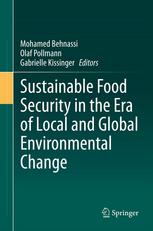

Most ebook files are in PDF format, so you can easily read them using various software such as Foxit Reader or directly on the Google Chrome browser.
Some ebook files are released by publishers in other formats such as .awz, .mobi, .epub, .fb2, etc. You may need to install specific software to read these formats on mobile/PC, such as Calibre.
Please read the tutorial at this link: https://ebookbell.com/faq
We offer FREE conversion to the popular formats you request; however, this may take some time. Therefore, right after payment, please email us, and we will try to provide the service as quickly as possible.
For some exceptional file formats or broken links (if any), please refrain from opening any disputes. Instead, email us first, and we will try to assist within a maximum of 6 hours.
EbookBell Team

4.0
66 reviewsThis volume discusses a broad range of vital issues encompassing the production and consumption of food in the current period of climate change. All of these add up to looming, momentous challenges to food security, especially for people in regions where malnutrition and famine have been the norm during numerous decades. Furthermore, threats to food security do not stop at the borders of more affluent countries – governance of food systems and changes in eating patterns will have worldwide consequences. The book is arranged in four broad sections. Part I, Combating Food Insecurity: A Global Responsibility opens with a chapter describing the urgent necessity for new paradigm and policy set to meet the food security challenges of climate change. Also in this section are chapters on meat and the dimensions of animal welfare, climate change and sustainability; on dietary options for mitigating climate change; and the linkage of forest and food production in the context of the REDD+ approach to valuation of forests. Part II, Managing Linkages Between Climate Change and Food Security offers a South Asian perspective on Gender, Climate Change and Household Food Security; a chapter on food crisis in sub-Saharan Africa; and separate chapters on critical issues of food supply and production in Nigeria, far-Western Nepal and the Sudano-Sahelian zone of Cameroon. Part III examines Food Security and patterns of production and consumption, with chapters focused on Morocco, Thailand, Bahrain, Kenya and elsewhere. The final section discusses successful, innovative practices, with chapters on Food Security in Knowledge-Based Economy; Biosaline Agriculture in the Gulf States; Rice production in a cotton zone of Benin; palm oil in the production of biofuel; and experiments in raised-bed wheat production. The editors argue that technical prescriptions are insufficient to manage the food security challenge. They propose and explain a holistic approach for adapting food systems to global environmental change, which demands the engagement of many disciplines – a new, sustainable food security paradigm.